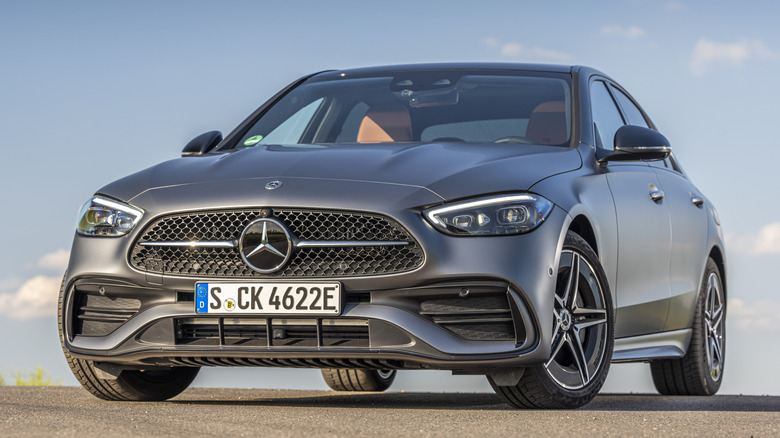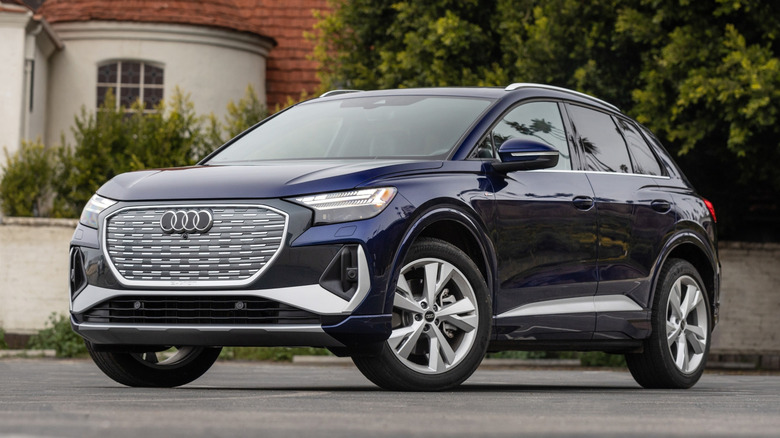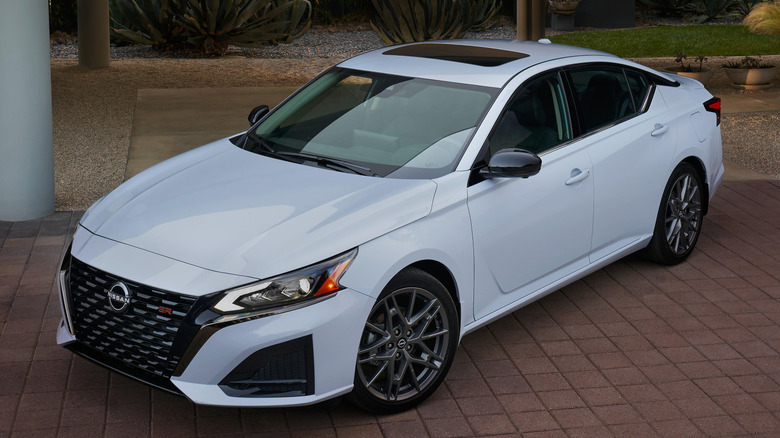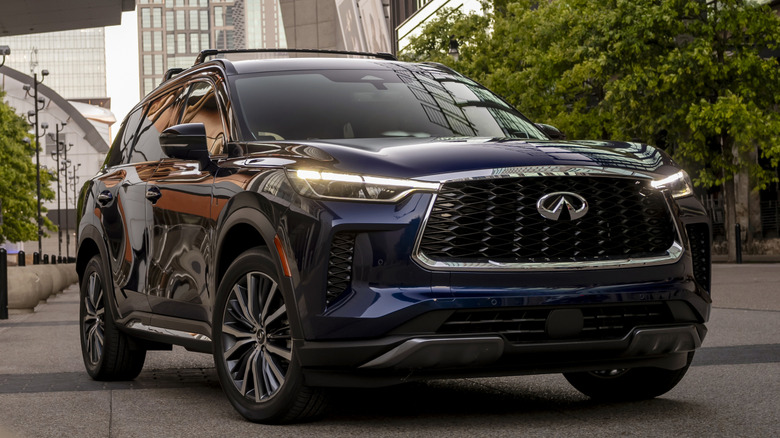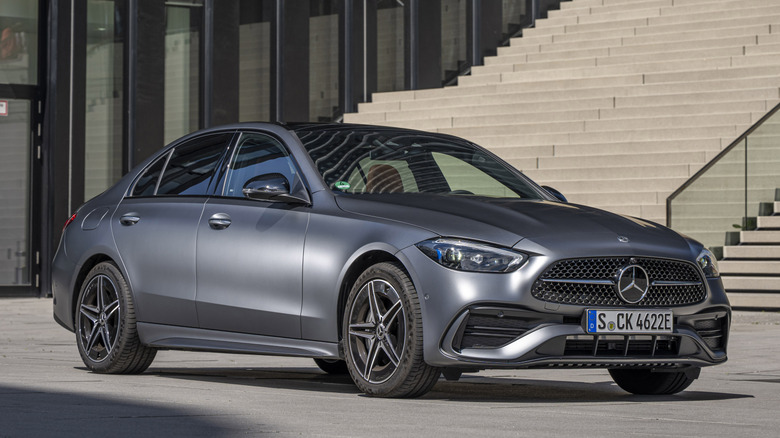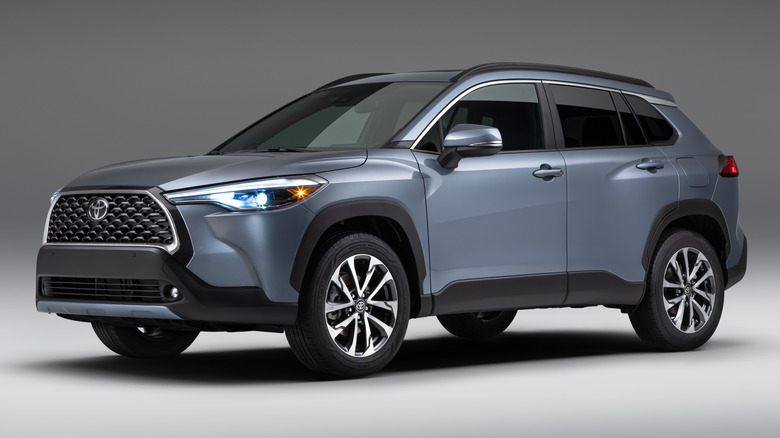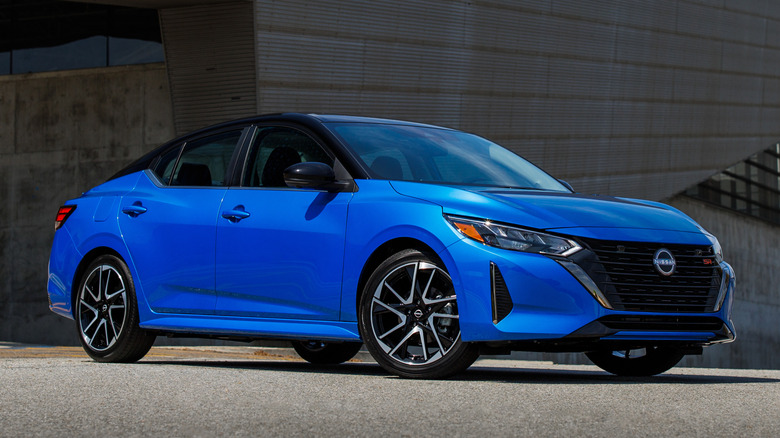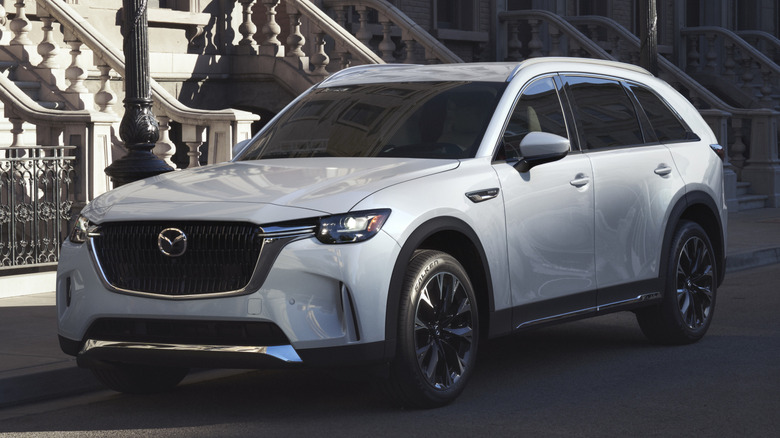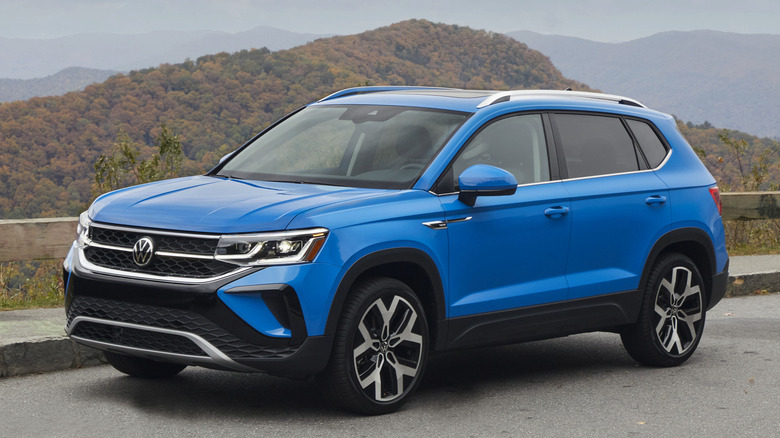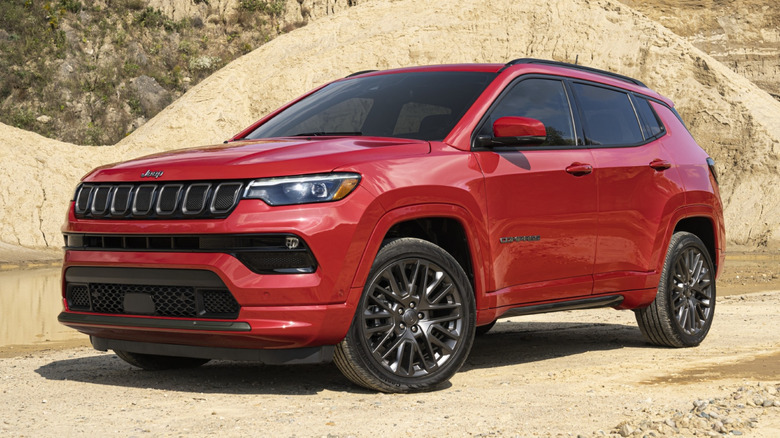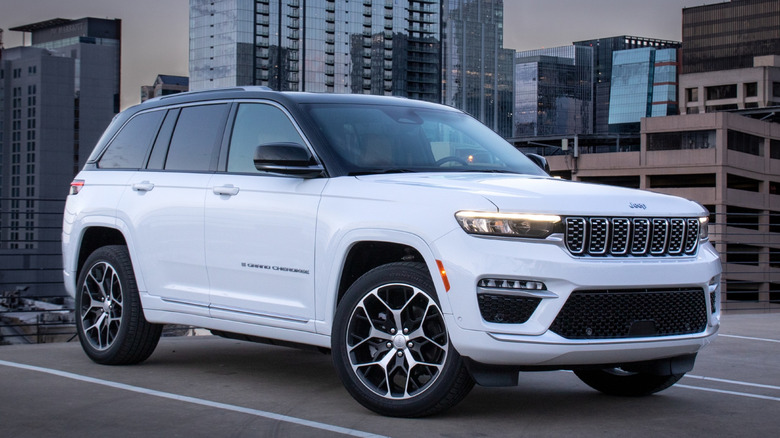The 10 Least Satisfying Cars & SUVs To Own, According To Consumer Reports
There's a lot to consider when buying a new car. Test drives and reviews are an essential part of figuring out if a vehicle is right for you, but they can only tell you so much; Even the most favorable first impression — or most positive of reviews — doesn't guarantee that the vehicle will be great to live with in the long run.
Unfortunately, there isn't a foolproof solution to this problem. Long-term reviews can offer a more realistic take on a car, but not all outlets have the time to make one. Even the ones that do can't hope to add every single new vehicle to their fleet. User opinions are great, but it can be a chore to sift through post after post to get an accurate picture of the owners' satisfaction. The fact that unhappy owners are more likely to share their experiences than happy owners complicates matters further.
And so, what is a prospective car buyer to do? A combination of the above (professional long-term reviews and user sentiment) is likely the best choice, but help is also available from Consumer Reports. The website released its own list of the least satisfying vehicles to own, based on user sentiment, at the end of 2024. The list isn't the be-all-end-all of long-term worthiness, but it can offer an extra reference point to help you find the perfect vehicle.
Audi Q4 e-tron
Audi's range of e-tron EVs encompasses everything from the refined Q4 e-tron to the bonkers RS e-tron GT performance, and a couple of larger SUVs in between. While all of them have reviewed very well in the hands of testers, the baby of the range, the Q4 e-tron, finds itself on CR's list of least satisfying vehicles to own.
The 2024 Audi Q4 e-tron was available in two versions: the Q4 40 e-tron and the Q4 50 e-tron. The latter eventually received a mid-year refresh that introduced several notable upgrades and a new name, the Q4 55 e-tron. It had more power, quicker charging, and a revised suspension, earning praise from the automotive media, especially as the improvements came at no extra cost to the buyer. Unfortunately, those models disappointed their owners, and only 48% of polled CR members were willing to buy a Q4 e-tron again.
On paper, it's not hard to imagine that the Q4 40 e-tron was the one to let down its owners, with less than great charging speed compared to other EV rivals. This likely hurt the value proposition, too, considering the $50,000-plus MSRP. Mechanical and build quality weren't too hot, either. J.D. Power echoed CR's opinion with a so-so 67 out of 100 quality and reliability score.
Nissan Altima
The Nissan Altima is, by most accounts, a good car for the price. It's not flashy or exciting but, as we found out during our review of the 2025 Altima, there's a lot to appreciate about a car that offers something a tier above most of its rivals. The Altima does that well, being a cheap ($27,000 for the Altima S) and eminently sensible purchase for those who want something for basic commuting duties.
Now, if none of that sounds like the recipe for a very satisfying car, you'd be right. "Affordable" and "sensible" are great, but Nissan hasn't tried to make its recent Altimas stand out; there's no hybrid, for example, and its design, while not ugly, pales in comparison to the new Honda Accord's sleek lines. Thus, it shouldn't be a huge shock that only 48% of CR's survey respondents indicated that they'd rebuy an Altima.
To be clear, the Altima is a fine car, and it makes a lot of sense for cost-conscious shoppers looking for a new vehicle. That said, it's probably also a car that most buyers would want to upgrade from. In that sense, its poor performance in CR's survey perfectly reflects its status as something of a stepping stone.
Infiniti QX60
You'd hope that motorists who stumped up the cash for an Infiniti QX60 would be satisfied by their plush seven-seater SUV. The Infiniti started at around $50,000 in 2024, the year CR assembled its list, and climbed as high as $66,100 for the top-end Autograph AWD trim. That's a pretty high investment, even for an SUV.
In Infiniti's defense, you do get a pretty luxe interior for that money. We tested the 2024 Infiniti QX60 and appreciated the spacious, high-quality interior of the Autograph trim, with its swathes of leather and top-notch Bose speaker setup. It was a genuinely nice place to be, and it's an undeniable strength that Infiniti has retained with newer iterations. And while the base-level trims aren't quite as plush — the 2026 QX60 Luxe uses a synthetic TailorFit material, for example — they're still decently equipped overall.
So why, then, did only 46% of CR members say they'd stick with a QX60 for their next vehicle? The cost of the higher-end trims was likely one factor, hurting the value proposition somewhat. What's more damning, however, is that the 2024 Infiniti QX60 was just a Nissan Pathfinder mechanically, complete with the same unrefined V6. The Pathfinder, however, is cheaper, and has room for an extra passenger. Nissan has changed that in the years since, but it's arguably gone backward: The weaker VC-Turbo engine that debuted in the 2025 Infiniti QX60 was slow and not particularly frugal, offering the worst of both worlds.
Mercedes-Benz C-Class
Starter cars often get a bad rap for being dull, unexciting, and lackluster to own, but cars like Mercedes-Benz's C-Class show that buying an offering from a prestige brand isn't exactly a recipe for "happily ever after," either. While it's far from the worst car on the list, the fact that only 45% of owners indicated that they'd rebuy a C-Class isn't a good look, especially not for a storied brand like Mercedes-Benz.
Is the C-Class a bad car? No, not really, if our first drive of a 2022 C-Class is anything to go by. We thought it was a finely balanced car, with good tech, a comfortable interior, good ride quality, and just enough performance from its four-cylinder engine to satisfy. Unfortunately, the one major aspect we couldn't test — reliability — seems to be the model's Achilles' heel. Consumer Reports didn't have much confidence in the C-Class' reliability, while J.D. Power gave the 2024 C-Class an "average" reliability rating of 80 out of 100. Not quite the ringing endorsement you'd want for a car that cost around $50,000 new.
Some reviewers also thought the C300 was uninspiring to drive, with a muted steering feel. While that's hardly the gravest sin a car can make, the combination of disappointing steering feel and suspect reliability may have pushed owners to seek out greener pastures.
Toyota Corolla Cross
The excellent GR Corolla hatchback aside, Toyota's long-lived Corolla nameplate is associated more with everyday practicality instead of driving thrills. That extends to the Corolla Cross, an SUV take on the nameplate that debuted in the U.S. for the 2022 model year. As with many cars on this list, that doesn't mean it's a bad vehicle; After all, all you may really need is a functional commuting vehicle for a small family. However, as we discovered when we tested the 2024 Corolla Cross Hybrid, being a sensible and affordable SUV doesn't come with much in the way of excitement.
We thought the driving dynamics were uninspiring at best, while the overall package lacked refinement. And that's with the extra strength provided by the hybrid powertrain, too: The hybrid's 196 hp combined was a healthy increase over the gasoline Corolla Cross' 169 hp. The Corolla Cross Hybrid wasn't very fast, still, and the gasoline Cross would have been positively soporific in a straight line.
It's likely the so-so interior quality, weak engine, and mediocre driving experience that led to just 45% of Consumer Reports' survey respondents expressing a willingness to buy a Corolla Cross again. There's also the fact that Toyota also makes the RAV4, which has more power and better equipment. Sure, it's around $5,000 more expensive, but it's not hard to envisage Corolla Cross owners opting to switch to the RAV4, were they to stick with a Toyota.
Nissan Sentra
Shopping at the cheap end of the market often entails making sacrifices. To its credit, recent iterations of the ultra-cheap Nissan Sentra, such as the 2025 Sentra SR we reviewed, have at least ensured that budget buyers aren't stuck with a boring-looking econobox. No, it's not going to get the pulse pounding, but it's hard to argue with a starting price of $21,590 (plus $1,245 destination).
The modern Sentra looks good, has solid fuel economy, and offers decent equipment for the price. It's also reliable, with an 86 out of 100 reliability score from J.D. Power and a similarly positive outlook from CR. These are all great characteristics for a cheap car, and undoubtedly why CR named it one of the best new cars under $25,000. But given that even the somewhat sporty Sentra SR is still a boring car to drive, we don't blame Consumer Reports members for being unsatisfied with their choice: Just 44% said they'd repurchase one.
Now, that's not necessarily a bad thing. The Sentra does what it needs to do, namely, offer very cheap four-wheeled mobility without too many sacrifices. If most owners would rather move on from the Sentra, it's likely they've already set their sight on something else. But that's fine; There's always going to be a wave of buyers looking for their first new car, and the Sentra will be right there waiting for them.
Mazda CX-90 PHEV
Mazda has a great reputation for driver-friendly cars, and that extends to the CX-90, which has a handful of features that make it stand out compared to other large, three-row rivals. It has also been available in a PHEV version since its 2024 debut. In the 0 to 60 mph test, the gas-electric powertrain was actually quicker than the full-featured turbocharged gasoline CX-90, according to Car and Driver. Sure, it was only by 0.4 seconds, but quicker is quicker.
Unfortunately, the hybrid power and solid EV range of the first-generation CX-90 PHEV came with a range of reliability downsides. Consumer Reports was deeply pessimistic about the model's long-term reliability, while Motor Trend's long-term test brutally exposed many first-gen woes. Issues that the outlet noticed included a lurching and shuddering transmission, numerous software- and hardware-related recalls, iffy on-board GPS, and intrusive driver aids. There were also a range of other, smaller complaints, all of which add up. In that light, it's not surprising that only 41% of CR members said they'd replace their CX-90 PHEV with another one.
However, that was 2024. Since then, Mazda has announced an improved CX-90 PHEV, which offers more creature comforts from the factory. Heated, ventilated, and power-adjustable seats and a leather steering wheel aren't game changers, but they may make it a better SUV to live with in the long term. And, of course, here's hoping that Mazda's ironed out the CX-90 PHEV's kinks, now that it's hitting its third year.
Volkswagen Taos
German car brands may have something of a reputation for class and refinement, but that image isn't always borne out in reality. Just ask owners of the Volkswagen Taos, the company's compact five-seater SUV. Just 39% of Consumer Reports' survey respondents expressed a willingness to repurchase, a poor showing by any standard.
Now, in the Taos' defense, it's not one of Volkswagen's premium products. With a starting MSRP of $23,995 (plus $1,350 destination) in 2024, the Taos competes firmly at the budget end of the market, vying for the same buyers as small SUVs like the Toyota Corolla Cross. That said, Taos can be as expensive as $33,000. Anybody piling on the optionals to this extent would perhaps find the Taos' failings harder to live with.
Somewhat unsurprisingly, given the recent reputation of German automakers, those failings seem to center on the Taos' reliability (or lack thereof). CR took a dim view of the SUV's reliability prospects, and J.D. Power was similarly unimpressed, scoring the 2025 Taos 80 out of 100 for its reliability metric, earning it an "average" rating. The 2024 Taos' transmission, in AWD form at least, wasn't all that smooth, nor was the engine all that inspiring. It was, and is, a surprisingly roomy and practical vehicle for its size, but that's not enough to ensure customer loyalty these days.
Jeep Compass
Jeep offerings have a reputation for their off-road prowess, no doubt underscored by the off-road legend, the Jeep Wrangler. The Jeep Compass is about as far removed from the Wrangler as you can get while remaining a Jeep, being more of a soft-roader than anything else. However, it still has a good helping of Jeep's off-roading DNA, especially after getting a standard AWD drivetrain in 2022.
We thought the 2023 Jeep Compass was a solid all-rounder during our time behind the wheel, and other professional reviews seem to echo that sentiment. It's not perfect, of course, but the consensus seems to be that there's nothing wrong with the Compass. Why, then, did just 38% of surveyed CR members say they'd rebuy one? Unfortunately, Consumer Reports doesn't offer any explanation, while J.D. Power disagrees and gives it a reliability score of 81 out of 100. Even the NHTSA can't shed much light here, with no recalls and not many complaints logged.
A possible reason is found in Car and Driver's verdict on the 2025 Compass. The outlet noted that the Compass isn't quite as refined as its competitors, such as the Honda CR-V, Mazda CX-5, and Ford Bronco Sport. It has the advantage off-road, but nowhere else. Thus, the low satisfaction rating from CR members may reflect the fact that there are better options for doing what most Compasses do: namely, drive around town.
Jeep Grand Cherokee 4xe
The Jeep Grand Cherokee debuted for the 1993 model year and has been a strong seller since then, earning a place as Jeep's best-selling SUV thanks to its blend of off-road capability and luxury, which has been a constant over the Grand Cherokee's five generations. While that combination still defines the nameplate to this day, Jeep has commendably taken strides to reduce its flagship model's dependence on gasoline by introducing the hybrid Grand Cherokee 4xe in 2022.
Debuting with five trim levels and prices ranging from $57,000 to $75,000, the Grand Cherokee 4xe married a turbo 2.0-liter with two electric motors, for a total output of 375 hp and 480 lb-ft of torque. Reviewers of the time appreciated the extra power, but were unimpressed by the PHEV's minor fuel efficiency gains. We felt similarly during our first drive of a 2022 Grand Cherokee 4xe, and the issue has persisted across the following model years.
The meager fuel economy benefits sadly come with a significant price premium. Going by 2025 prices, you can get a Grand Cherokee Summit, the second-highest trim, for roughly the same price as a starter Grand Cherokee 4xe. This disparity likely plays a part in why just 34% of surveyed CR members were willing to rebuy. Sure, the Grand Cherokee 4xe is capable, luxurious, and decent to drive, but those are traits shared by the gas-powered Grand Cherokee.
